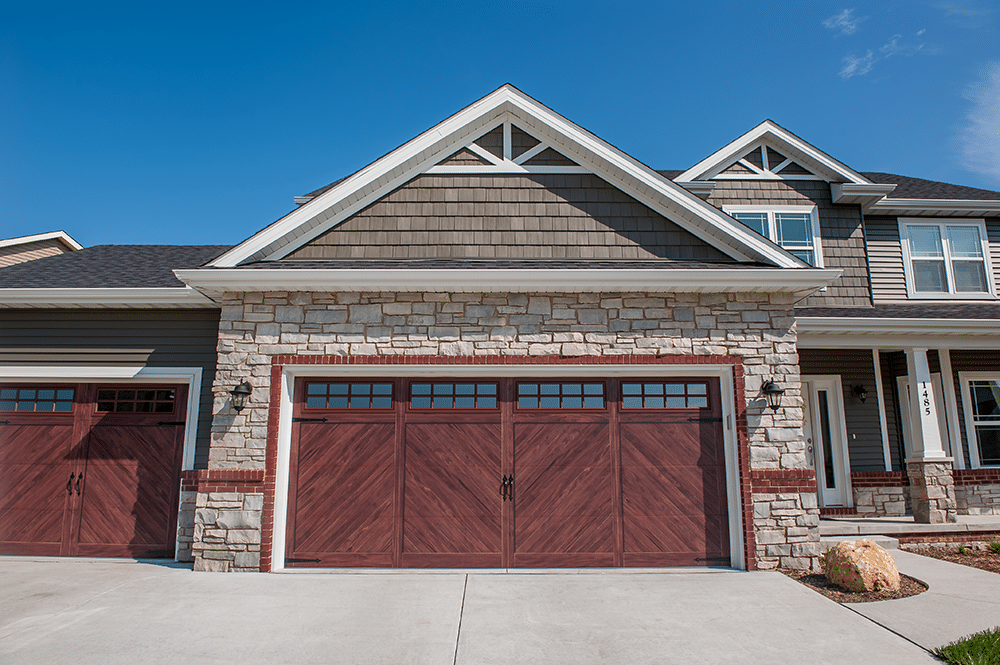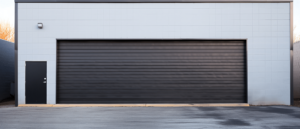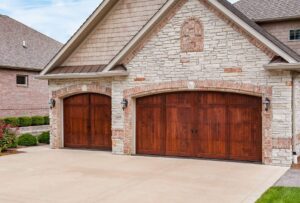Topics Covered:
Known, for their natural warmth, aesthetic versatility, and Wood garage doors offer unparalleled beauty and functionality and are a timeless addition to any home. While wood garage doors come with higher upfront and maintenance costs, their classic beauty, customization options, and long lifespan make them a worthwhile investment. When you choose the correct wood type, incorporate your own stylistic flair and modern features, and adhere to a consistent maintenance schedule, your wood garage door adds curb appeal and functionality to any home.
Average Cost: $1,200-$4,000 for standard wood doors; upwards of $10,000 for more high-end custom doors, particularly if they include exotic woods or intricate designs.
Benefits of Wood Garage Doors
- Styles of Wood Doors
Wood doors are highly customizable and can be built, stained, or painted, to match any architectural design. Whether you have a traditional colonial home, a sleek contemporary property, or a classic Victorian, wood doors can be tailored to enhance the curb appeal of your home. Additionally, wood is a highly adaptable material which means that intricate designs and decorative details, like carriage-style accents, raised panels, or windows can easily be incorporated.
- Wood Door Functionality
Wood garage doors offer flexibility in design and compatibility with various operational mechanisms, including manual and smart openers. This seamless integration and aesthetic versatility means that wood doors provide convenience without compromising the traditional style. Another key advantage of wood garage doors is their natural insulating properties which help maintain the temperatures and energy efficiency of your home.
- Wood Door Durability
When properly maintained, wood garage doors are incredibly durable and can last between 15 and 30 years. Premium wood choices, including cedar, redwood, and mahogany, are naturally resistant to common issues like warping, rotting, and pest damage and can withstand variable weather conditions such as humidity, regular precipitation, and fluctuating temperatures. While wood garage doors do require more maintenance than steel or aluminum, their durability and aesthetics can justify the additional effort depending on your priorities.
- Wood Doors Safety Features
Safety is a top priority since modern garage doors often conveniently operate from remote clickers or smartphone apps. These automatic openers often feature sensors that can detect objects or people in the door’s path and trigger an automatic reverse mechanism to prevent accidents. Some of the more modern models also incorporate smart technology not just for operation but also for remote monitoring and control, enhancing home security. These features can be especially important for families with children or pets, adding extra layers of security. For wood doors, specifically, you’ll most likely need to invest in a weather seal to protect against environmental elements like rain, snow, and wind, as well.
- Added Home Value
Wood doors, in particular, can significantly boost your home’s value by elevating the home’s curb appeal and leave a lasting impression on potential buyers. Their premium look and feel can really set your property apart, especially in competitive housing markets.
How to Choose the Right Wood Garage Door
- Select the Right Type of Wood
The type of wood you choose for your garage door plays a critical role in its durability and appearance. Each type of wood offers unique benefits and should be chosen based on your specific needs, including local climate, aesthetic, and maintenance threshold. The most popular wood types include:
- Cedar, which is lightweight and resistant to rot and pests. It also has a beautiful, natural grain pattern that can be enhanced with stains or sealants. This material is ideal for humid or coastal regions, requires less maintenance than other wood types, and is lightweight and therefore reduces strain on the garage door mechanisms.
- Mahogany, which is dense, durable, and known for its luxurious grain. It is a popular option for those who prioritize luxury and durability. Its dense composition makes it resistant to warping and wear and tear over long periods of time. It also has a rich, reddish-brown hue that exudes elegance and adds a high-end, timeless appeal to your home.
- Pine, which is a more affordable option but may require more maintenance over time. It is a versatile option that is highly customizable with its light color and smooth surface. However, pine is naturally softer than other woods so it is more susceptible to dents, scratches, and warping and will require more maintenance such as (re)sealing or (re-)painting.
- Match Your Home’s Style
As you choose the right wood door for your home, consider how the design and finish will complement your home and elevate its curb appeal. For example, rustic homes pair well with natural stains that bring out the wood grain. Contemporary homes typically incorporate sleek, minimalist designs with painted finished in neutral tones. Whatever style you choose, by aligning the look of the wood garage door with your home’s other wood accents, you ensure a cohesive and polished aesthetic.
- Budget for Customization
Custom wood garage doors offer unique designs for homeowners seeking distinctive aesthetics but come at a higher cost. When choosing the right wood door, be sure to budget in a way that balances aesthetics and practicality by considering components like durability and weather resistance as well as intricate designs, specialty finishes, or premium wood. This way, you can ensure your design meets both your stylistic and financial goals and achieve a personalized wood door that combines beauty and functionality without stretching your budget.
Maintenance Tips for Wood Garage Doors
Proper maintenance is essential for extending the lifespan of your garage door. Some tips include:
- Regularly inspect and clean the door: Check for dirt and other buildup or physical damage, especially around the seals. Consider using a mild detergent and water to clear the door every 3-6 months, but be sure to avoid abrasive cleaners that can damage the wood’s surface.
- Seal and refinish: Wood is susceptible to moisture and UV damage, so apply a protective sealant every 1-3 years to prevent cracking, warping, or discoloration. For painted wood doors, consider touching up the paint as needed.
- Lubricate the moving parts: Keep hinges, rollers, and tracks lubricated to ensure smooth operation.
- Schedule professional inspections: To ensure your garage door is in good working condition, have a professional inspect your door annually.




